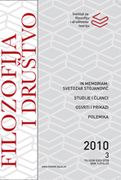Umetnost i kritika prosvetiteljstva
Art and the Critique of the Enlightenment
Author(s): Marko NovakovićSubject(s): Philosophy
Published by: Institut za filozofiju i društvenu teoriju
Keywords: rationalization; myth; reason; mimesis; art; truth content; form; enlightenment
Summary/Abstract: The aim of this paper is to provide an examination of the concept of aes thetic rationality in the philosophy of art of Theodor W. Adorno, related to his cel ebrated critique of the enlightenment in The Dialectic of the Enlightenment written with Max Horkheimer. Our main purpose is to show how Adorno’s conception of art responds to a problem posed in the former study, namely that of a dialectical self enchantment and alienation of subjective reason. In the first two sections is shown how selfpreservation of subjective reason leads to its fall into the realm of myth. This turn was dialectically exposed in Adorno’s interpretation of Odysseus’ voyage as prahistory of subjectivity. The next four chapters expose a necessity and mode of critical approach and possibility of a transcendence of this mythical reality of reifi cation in the structure of works of art, especially their form, with its ultimate goal to free individuals from social injustice and unconscious enslavement. Adorno’s ac count of the dialectics of aesthetic semblance, artistic truth content and immanent law of its form which embodies the consciousness of nonidentity provides an ex planation how modern art mimetically manages to transcend conditions of empirical reality and at the same time offers a plausible model of a “transitive“ rationality, which serves to discover its better possibilities.
Journal: Filozofija i društvo
- Issue Year: 21/2010
- Issue No: 3
- Page Range: 119-144
- Page Count: 26
- Language: Serbian

